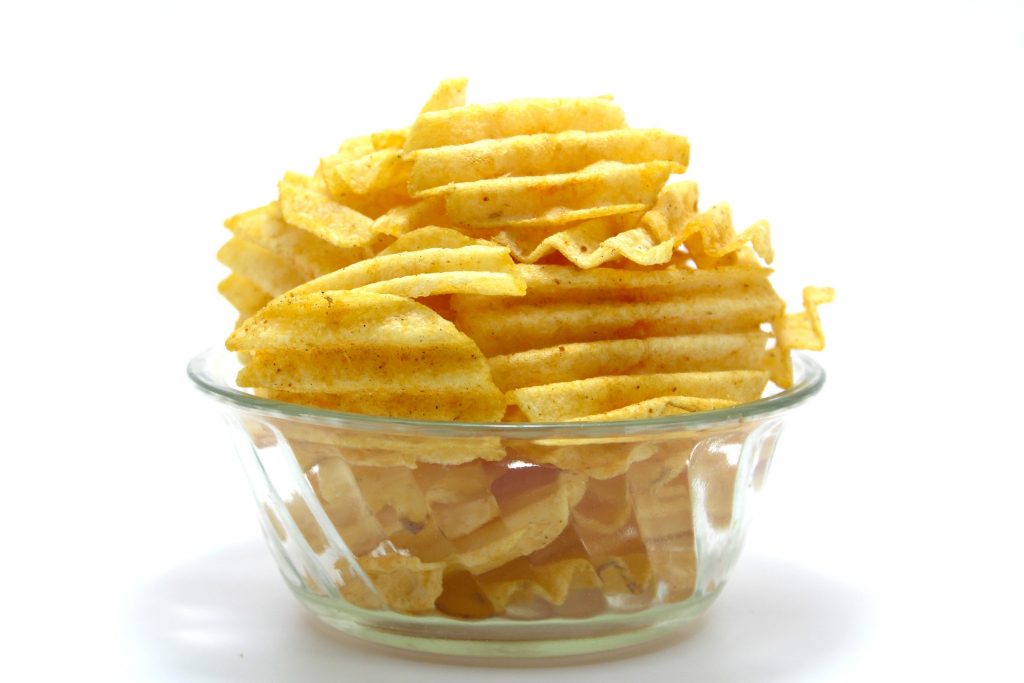 Processed and fast foods contain high amounts of salt (sodium chloride). Consumption of the typical Western diet, which contains high amounts of processed and fast foods, therefore increases salt intake significantly. The high salt intake of the Western diet in turn increase the sodium to potassium ratio of the diet and this increases the risk of cardiovascular disease significantly. However, many of the foods that are high in salt are also high in other food components that can be detrimental if eaten to excess. For example, high salt foods such as crisps, chips, meat, cheese and fast food also contain high amounts of fat. Salt is a highly palatable food to humans and so it becomes easy to overconsume both salt and the associated fat if these types of foods are consumed. For this reason, fat is often over consumed in processed and fast foods because of the desire to satisfy the taste for salt. This may be one of the reasons that processed and fast foods leads to weight gain and obesity.
Processed and fast foods contain high amounts of salt (sodium chloride). Consumption of the typical Western diet, which contains high amounts of processed and fast foods, therefore increases salt intake significantly. The high salt intake of the Western diet in turn increase the sodium to potassium ratio of the diet and this increases the risk of cardiovascular disease significantly. However, many of the foods that are high in salt are also high in other food components that can be detrimental if eaten to excess. For example, high salt foods such as crisps, chips, meat, cheese and fast food also contain high amounts of fat. Salt is a highly palatable food to humans and so it becomes easy to overconsume both salt and the associated fat if these types of foods are consumed. For this reason, fat is often over consumed in processed and fast foods because of the desire to satisfy the taste for salt. This may be one of the reasons that processed and fast foods leads to weight gain and obesity.

Humans have a particular attraction to foods containing salt. The food manufacturers are aware of this phenomenon, and they use it to increase the palatability of their food significantly by drastically increasing the salt intake. This is why many fast and processed foods contain high amounts of salt. Without this salt the foods would be bland and tasteless and would not be purchased by consumers. Sugar is used in a similar way because it is palatable to humans. The main problem with these types of foods are that firstly the sodium intake of the individual becomes excessive and this upsets the potassium to sodium balance in the body. Secondly there is a much higher risk of over consuming these types of foods and therefore over consuming total energy. If this energy is in the form of sugar, this can be particularly detrimental as the excess sugar can cause insulin resistance. However, over consumption of any macronutrient can be problematic.
Salt and fat containing foods are therefore in interest to researchers. In this regard the effects of fat and salt have been investigated in healthy adults. Addition of salt to food has been shown to increase energy intake by 11 %, independent of the fat concentration. However, addition of fat to food has been shown not to affect overall food intake, but as the foods consumed have more fat, energy intake can increase by 60 %. Further in high fat meals, women may consume as much as 15 % less than men. Therefore addition of salt to foods causes a passive intake of energy as the individual tries to satisfies their taste for salt by overeating energy. However, fat does not cause the same effect. Instead, addition of fat to foods causes an increase in energy consumption because although the same amount of food is eaten, the food is significantly more energy dense. This suggests that lower fat foods without added salt might be the best foods to consume in order to lower energy intake. Fruits and vegetables seem to satisfy this criteria well.
Eat Well, Stay Healthy, Protect Yourself
RdB
